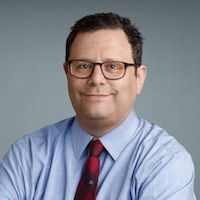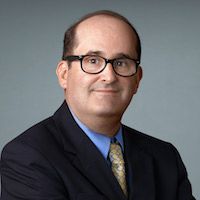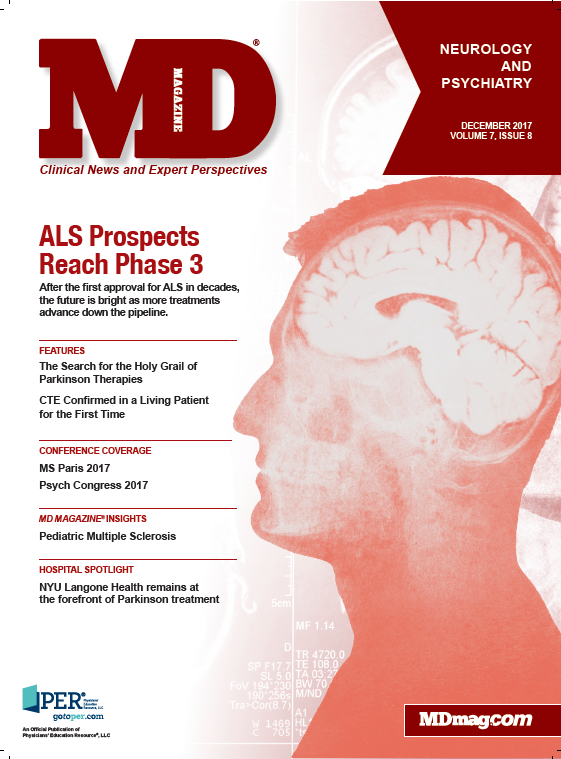NYU Fresco Institute Takes a Practical Approach to Parkinson Disease
"By the middle of next year or this time next year, it will be clear to people even outside the movement disorder community that this is a powerhouse center." —Steven J. Frucht, MD
In 2015, Paolo Fresco, the former head of Fiat, donated $25 million to New York University (NYU) Langone Medical Center—now NYU Langone Health—in New York City for a particular purpose. He aimed to create a way to help people with debilitating movement disorders after his wife, Marlene, received care there for a neurological condition—Parkinson disease (PD).
Now, just over 2 years later, the Marlene and Paolo Fresco Institute for Parkinson’s and Movement Disorders is setting itself up as a leader in the space and provides care for almost 5000 patients per year. The institute recently brought on 2 renowned physicians—Andrew S. Feigin, MD, and Steven J. Frucht, MD—as co—executive directors to lead the center.

Steven J. Frucht, MD
“I think we both realized that this was a unique opportunity,” Frucht told MD Magazine®. “It was sort of a decision on the part of the institute and the leadership here to really make a sea change and move things to another level. We were both pleasantly surprised and decided this was a unique opportunity.”
“Because we’ve known each other for a long time, we knew we got along and could work together, and even though we both do clinical work and research, there is a good melding of expertise,” Feigin said. “We have different areas of interest and expertise within those parameters that work well together.”
With the help of Ritesh Ramdhani, MD—a “rising star,” Frucht said—a movement disorder specialist who previously helped run the deep brain stimulation (DBS) program at Mount Sinai Medical Center, both Frucht and Feigin are pushing the Fresco Institute forward in terms of care for patients with PD. The institute operates with a 3-pronged plan: improved care through clinical services, better educational services for patients and their families, and establishment of international centers of excellence for PD treatment.
A Fresco center already exists in Italy. The Fresco Parkinson Institute of Excellence, which aims to establish a clinical presence in Europe, works with the NYU center constantly. “I don’t know of other PD centers, at least in the US, that have this formal international link for education and for care,” Feigin said.
Although that connection differentiates the institute, one of its major strengths lies in its multidisciplinary approach to treatment that concentrates on practical issues faced by patients with PD, according to Frucht and Feigin.
“I think that in a lot places that have famous movement disorder specialists, you go to see a doctor or a well-known specialist in movement disorders and you get treated very well, but they may not provide this kind of multidisciplinary care that we’re already offering,” Feigin said. More important, he added, the approach is the same at all Fresco centers, including the Italian institute. Focusing on the patient’s quality of life was all part of Paolo Fresco’s vision, he said.
“There are, of course, many programs out there and a lot of research out there that’s being done—which is fascinating—on genetics, on stem cell biology, on gene therapy,” Frucht said. “These are major and powerful initiatives, but it’s very important to [Paolo Fresco] that the practical issues of the patient do not get lost in the picture.”

Andrew S. Feigin, MD
The institute offers a multitude of services—social work, rehabilitation, and research, just to name a few—in a single location. “All these other types of disciplines can really help to improve the quality of life for people with PD and related disorders,” Feigin said.
More centers are adopting that multidisciplinary approach, which both doctors consider especially significant. Feigin compared the approach to that taken by the Cystic Fibrosis Foundation, which set criteria for patient care among its various centers of excellence, leading to better outcomes.
“That was controversial when it was first done, and there was resistance to that and people were protective, but the outcomes suddenly improved for the patients, very significantly—by ‘outcomes,’ I mean the disability and death—because it forced the centers to adopt what are now viewed as the standard best-care policies,” Frucht said. “I think there is a similar [movement] happening in the PD community. Different illness, different challenges, different patient population—but also PD is now recognized as quite common. There are certainly more than a million patients in North America with this, and there is a lot of disability from it. I think you’re seeing that, and a center like NYU has the legs to…implement that sort of approach.”
The Fresco Institute is sharing the wealth. It has what Frucht and Feigin refer to as a “commitment to training” to benefit not only the Fresco Institute but also the PD space in general. “We train people to know the best way of doing things, and they go out and work at other places. It’s spreading the quality of care even beyond the centers, potentially,” Feigin said.
The Fresco Institute also gets involved in as many clinical trials as it can, with the goal of giving its patients the opportunity to use novel therapies.
“Combined with the fact that we’re also expanding on what already existed as a research base in basic science research, [the Fresco Institute uses] translational research,” Feigin said. “Offering the state-of-the-art clinical trials for our patients is also important. Again, that would be true here at NYU, but it’s also going to be true at the other Fresco centers, so I would say our uniqueness [is shared].”
With so many needs unmet in the PD world, Fresco's focus centers on the disability caused by the disease. Patients experience issues with walking and performing daily tasks; they have falls, which cause injuries. The Fresco Institute aims, first and foremost, to improve the quality of life for its patients.
“We work on those things through rehabilitation services, through physical therapy, through optimizing their medical therapy, and through clinical research with novel drugs and novel methods that we think might improve these unmet needs,” Feigin said. “We’re talking about starting a trial of a different way of programming DBS to try to help gait and balance in people with PD. That’s just 1 example…of the kind of specific clinical unmet needs we’re addressing both through multidisciplinary care and clinical research.”
A more immediate goal is to get more patients to the center for treatment. While that number has risen since Frucht’s arrival in August 2017 and Feigin’s 2 months later, the co—executive directors want to help treat as many people with movement disorders as possible.
“What I hope will happen, and what I already see happening in terms of volume of patients, referrals, and numbers of trials that are on the launching pad now,” Frucht said, “is that by the middle of next year or this time next year, it will be clear to people even outside the movement disorder community that this is a powerhouse center.”
